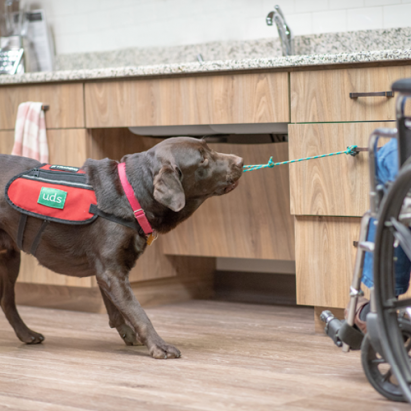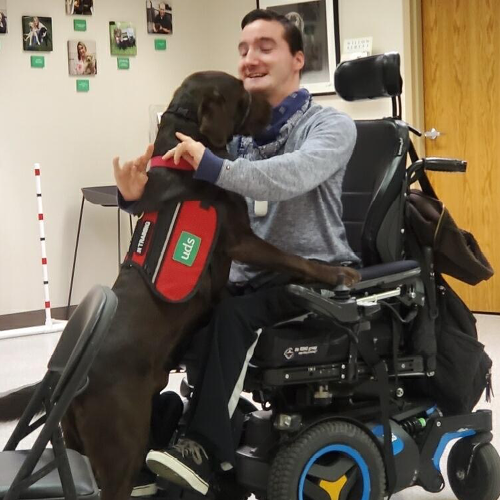
Disability Service Dogs To Help You Live Life More Independently
These loving dogs can help you with many daily tasks, including (but not limited to) the following:
- Opening and Closing Doors
- Turning Lights On and Off
- Picking Things Up From the Floor
- Balancing
- Retrieving
- Delivering
- Getting Items From the Fridge
Who May Benefit
Along with helping to perform basic tasks, these remarkable dogs become affectionate and loving friends. Our service dog team trains our dogs to help individuals with autism and a variety of mobility disorders. These can include:
- Cerebral Palsy
- Muscular Dystrophy
- Multiple Sclerosis
- Quadriplegia
- Paraplegia
- Amputation
- Stroke
- Spinal cord injuries
- Polio

Make A Difference
Gifts of any size make a positive difference to individuals with disabilities in our community.
Getting Started with a Service Dog
Due to the popularity of service dogs, we have a waiting list that can be as long as three years. This may not hold true in all cases, though, as we match the skills of our dogs with the needs of our clients. Our clients participate in one-on-one and group training sessions at our facility in Lancaster.
We encourage anyone thinking about getting a mobility assistance dog or a service dog for autism to start the process by completing an application today.
NOTE – AGE REQUIREMENT WHEN APPLYING FOR A SERVICE DOG FOR A CHILD:
Due to the popularity of service dogs, we have a waiting list that can be as long as three years. This may not hold true in all cases, though, as we match the skills of our dogs with the needs of our clients. Our clients participate in one-on-one and group training sessions at our facility in Lancaster.
We will consider placing a full service dog with a child who is at least 10 years of age. It is felt that younger children do not have the developmental skills necessary to allow for the consistent care and handling that is so vital for the success of a working team.
Since the usual waiting period for placement can be up to 3 years and in some cases 4 years for a balance/stability dog, please do not hesitate to complete the application if your child is currently age 7 or older. It is important that we learn about the applicant, so we ask that the person applying for the dog complete the application. If unable to do so, please complete it using the applicant’s own words. In the case of children under the age of 18 we support the assistance of the parents and/or guardians.
LIMITATIONS ON THE TYPE OF DOGS WE PROVIDE:
- We do not train or place Emotional Support Animals.
- Due to the specialized nature and high demand for providing dogs that help with balance and counterbalance, we are not currently accepting applications for these type of dogs at this time. CLICK HERE to learn more about mobility dogs and what our dogs can do for you.
- Due to the high demand for dog breeds that are less likely to stimulate allergies in people, we find it necessary to put a hold on accepting applications where a hypoallergenic dog is requested due to allergies of the applicant or within the family. We must first take care of those clients who have been on our waiting list for an extended period of time before adding new clients with allergy limitations to our wait list. We appreciate your patience and understanding. Please research our accrediting agency, https://assistancedogsinternational.org/ (ADI) for other agencies who may be able to assist you in a timely manner.
- Is any dog 100% non-shedding? Even though there is no canine breed that is 100% non-shedding, UDS Service Dogs Program trains Labradoodles, Goldendoodles, Aussiedoodles and Bernedoodles, these dogs are less likely to stimulate allergies in people.
Did you know…
You may be able to include the costs of buying, training, and maintaining a service dog as a medical expense when filing your income taxes.
In general, this may include costs, such as food, grooming, and veterinary care incurred in maintaining the health and vitality of the service dog so that it may perform its duties.
Consult your tax advisor to see if you qualify for this deduction.
UDS SERVICE DOGS ARE ACCREDITED BY ASSISTANCE DOGS INTERNATIONAL, INC. (ADI)
ADI is a worldwide coalition of non-profit programs that train and place Assistance Dogs. ADI has become the leading authority in the Assistance Dog industry. Their objectives are to establish and promote standards of excellence in all areas of assistance dog acquisition, training and partnership, facilitate communication and learning among member programs, and educate the public to the benefits of Assistance Dogs and ADI membership. Assistance Dogs organizations that pass ADI’s accreditation process become ADI Accredited Member program, and are assessed every five years to ensure they meet the highest standards in the industry.

